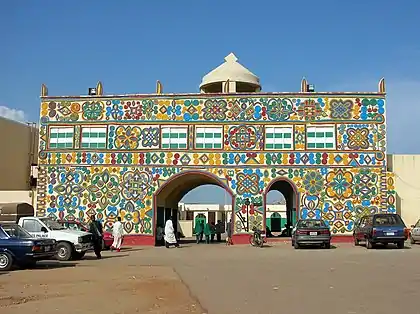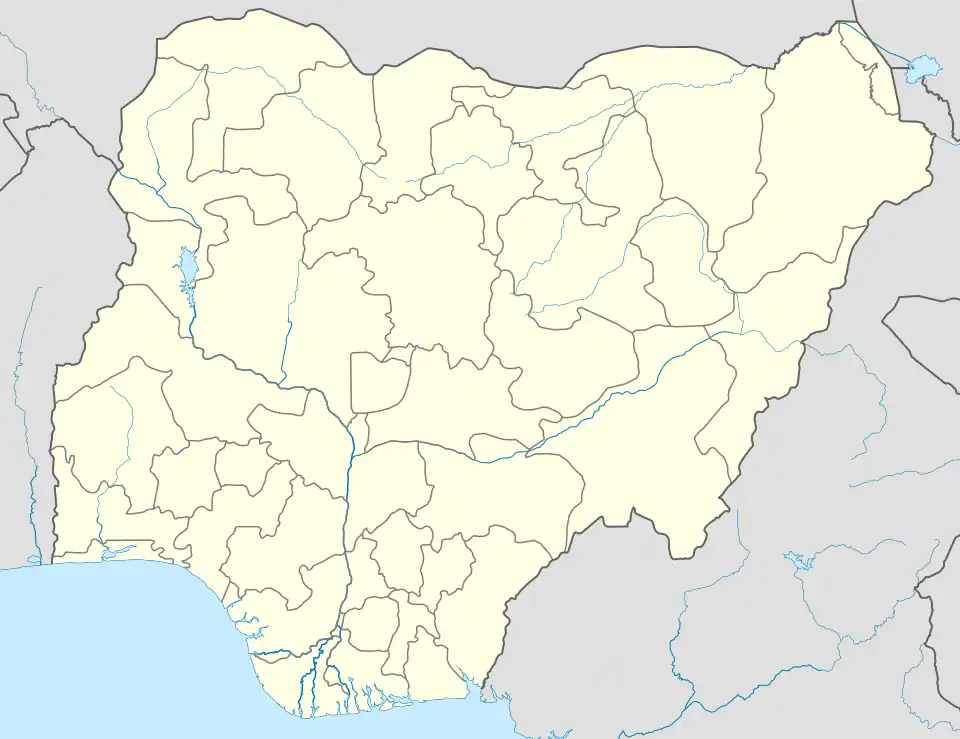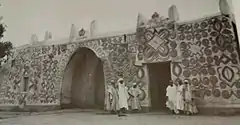Zazzau
The Zazzau, also known as the Zaria Emirate, is a traditional state with headquarters in the city of Zaria, Kaduna State, Nigeria. The current emir of Zazzau is H.E Alhaji Ahmed Nuhu Bamalli CFR, who succeeded the former emir, late Alhaji Shehu Idris.[1]
Zazzau | |
|---|---|
 Gate to the palace of the emir of Zazzau | |
 Flag | |
 Zazzau | |
| Coordinates: 11°04′N 7°42′E | |
| Country | |
| State | Kaduna State |
| Government | |
| • Type | Monarch |
| • Emir | Ahmed Nuhu Bamalli |
Early Hausa kingdom
The most important source for the early history of Zazzau is a chronicle composed in the early 20th century from an oral tradition. It tells the traditional story of the foundation of the Hausa kingdoms by Bayajidda an Arab adventurer from Baghdad, and gives a list of rulers along with the length of their reigns. According to this chronology, the original Hausa or Habe kingdom is said to date from the 11th century, founded by King Gunguma.[2] This source also makes it one of the seven Hausa Bakwai states. Zazzau's most famous early ruler was Queen (or princess) Amina, who ruled either in the mid-15th or mid-16th centuries, and was held by Muhammed Bello, an early 19th-century Hausa historian and the second Sultan of Sokoto, to have been the first to establish a kingdom among the Hausa.[3]
Zazzau was a collection point for slaves to be delivered to the northern markets of Kano and Katsina, where they were exchanged for salt with traders who carried them north of the Sahara.[4] According to the history in the chronicle, Islam was introduced to the kingdom around 1456, but appears to have spread slowly, and pagan rituals continued until the Fulani conquest of 1808. At several times in its history, Zazzau was subject to neighboring states such as Songhai, Bornu and Kwararafa.[5]

Later Fulani emirate
In December 1808 the kingdom was captured in the Fulani jihad.[6] The Hausa (Habe) ruler had escaped to Abuja, where he established a state now known as the Suleja Emirate, retaining his independence and the title of "Sarkin Zazzau". The ruler of the modern Zazzau Emirate also uses the title "Sarkin Zazzau" or "Sarkin Zaria". After the jihad, the culturally similar but pastoral or nomadic Fulani intermarried with the more settled Habe farmers, and the people of the Emirate today are generally known as Hausa-Fulani. The government of the Zaria Emirate differed from other emirates created at this time in that offices were rarely hereditary, but were appointed based on merit or obligation.[5]
Rulers
Hausa kingdom
Names and Dates taken from John Stewart's African States and Rulers (1989).[7]
Capitals (c. 1010 – c. 1578): Turunku, Wuciciri, Rikoci, Kawar[8]
| Start | End | Ruler |
|---|---|---|
| c. 1010 | ? | Gunguma |
| ? | ? | Matani (or Matazo) |
| ? | ? | Tumso (or Tumsah) |
| ? | ? | Tamusa |
| ? | ? | Sulimano |
| ? | ? | Nasabo (or Maswaza) |
| ? | ? | Danzaki (or Dinzaki) |
| ? | ? | Saiwago (or Nayoga) |
| ? | ? | Kwasari (or Kauchi) |
| ? | ? | Nwaiku (or Nawainchi) |
| ? | ? | Besekal (or Machikai) |
| ? | ? | Kuna (or Kewo) |
| ? | ? | Bashikarr |
| ? | ? | Maji Dadi (or Majidada) |
| ? | ? | Kirari (or Dihirahi) |
| ? | ? | Jenhako (or Jinjiku) |
| ? | 1505 | Sukana |
| 1505 | 1530 | Rabon Bawa (or Monan Abu) |
| 1530 | 1532 | Gudumua Muska (or Gidan Dan Masukanan) |
| 1532 | 1535 | Tukuariki (or Nohir) |
| 1535 | 1536 | Uwan (or Kawanissa) |
| 1536 | 1539 | Bakwa Turunku (female ruler) |
| 1539 | 1566 | Ibrihimu |
| 1566 | 1576 | Karama |
| 1576 | 1578 | Kafow |
The kingdom's name changed to Zaria at the end of the 16th century.[8]
Capital (c. 1578 – 1835): Zaria (originally founded in 1536 and named after Chief Bakwa's daughter Zaria)[9]
| Start | End | Ruler |
|---|---|---|
| 1578 | 1584 | Ali |
| 1584 | 1597 | Bako Majirua |
| 1597 | 1608 | Bako Su Aliyu |
| 1608 | 1611 | Bako Mahama Gabi (or Gadi) |
| 1611 | 1611 | Bako Hamza (ruled for one day) |
| 1611 | 1618 | Bako Abdu Ashkuku (or Abdaku) |
| 1618 | 1621 | Bako Brima (or Burema) |
| 1621 | 1646 | Bako Ali |
| 1646 | 1647 | Bako Majam Rubu |
| 1647 | 1660 | Bako Brima |
| 1660 | 1670 | Bako Shukunu |
| 1670 | 1678 | Bako Aliyu |
| 1678 | 1682 | Bako Brima Hasko |
| 1682 | 1710 | Bako Mahama Rubo |
| 1710 | 1718 | Bako |
| 1718 | 1727 | Bako Aliyu |
| 1727 | 1736 | Bako Dan Musa |
| 1736 | 1738 | Bako Ishihako (or Ishaq) |
| 1738 | 1750 | Bako Makam Danguma |
| 1750 | 1757 | Bako Ruhawa |
| 1757 | 1758 | Bako Makam Gaba |
| 1758 | 1760 | Bako Mair ari Ashaka Okao |
| 1760 | 1762 | Kao |
| 1762 | 1764 | Bako Bawa |
| 1764 | 1770 | Yonusa |
| 1770 | 1788 | Baba (or Yakuba) |
| 1788 | 1793 | Aliyu |
| 1793 | 1795 | Chikkoku |
| 1795 | 1796 | Mai haman Maigano |
| 1796 | 1802 | Ishihako Jatao (or Ishaq Jatao) |
| 1802 | 1804 | Makkam (or Muhamman Makau) |
Independent Fulani rulers

The kingdom was taken over by the Fulani Empire in 1804 and became an emirate in 1835.[9] The Hausa rulers went into exile and founded Abuja.[9] The emirate was taken by the British in 1902.[9]
Rulers of the independent Fulani emirate:[6]
| Start | End | Ruler |
|---|---|---|
| 1804[9] | 17 May 1821 | Malam Musa ibn Suleiman Ibn Muhammad |
| 1804 | 1825 | Muhamman Makau (Hausa ruler in exile)[9] |
| June 1821 | 1834 | Yamusa ibn Mallam Kilba |
| 1825 | 1828 | Abu Ja (Hausa ruler in exile)[9] |
| 1834 | 18 December 1846 | Abd al-Karim ibn Abbas |
| 6 January 1846 | 28 February 1846 | Hammada ibn Yamusa |
| 15 Apr 1846 | Apr 1853 | Muhammad Sani ibn Yamusa |
| Apr 1853 | Dec 1853 | Sidi `Abd al-Qadir ibn Musa |
| Jan 1854 | 5 Aug 1857 | Abd as-Salam ibn Muhammad Ka'i |
| 21 Sep 1857 | Oct/Nov 1871 | Abd Allah ibn Hammada (1st time) |
| 22 Nov 1871 | Jun/Jul 1874 | Abu Bakr ibn Musa (d. 1873) |
| Aug/Sep 1874 | Nov/Dec 1879 | Abd Allah ibn Hammada (2nd time) |
| 26 Dec 1879 | Jan 1888 | Muhammad Sambo ibn Abd al-Karim |
| Jan 1888 | 13 Feb 1897 | Uthman Yero ibn Abd Allah (d. 1897) |
| 17 Apr 1897 | Mar 1902 | Muhammad Lawal Kwassau ibn Uthman Yero |
Colonial period and later rulers
Rulers of the independent Fulani emirate:[6]
| Start | end; | Rulers |
|---|---|---|
| March 1903 | 8 April 1903 | Sulayman (regent from 11 Sep 1902) |
| 8 April 1903 | 9 November 1920 | Ali ibn Abd al-Qadir (d. 1924) |
| 1920 | 1924 | Dallatu ibn Uthman Yero |
| 1924 | 1936 | Ibrahim ibn Muhammad Lawal Kwassau (b. c.1886 - d. 1936) |
| 1937 | August 1959 | Malam Jafar ibn Ishaq (b. 1891 - d. 1959) |
| September 1959 | 4 February 1975 | Muhammad al-Amin ibn Uthman (b. 1908 - d. 1975) |
| 8 February 1975 | 20 September 2020 | Shehu Idris (b. 1936 - d. 2020)[10] |
| 7 October 2020 | Ahmed Nuhu Bamalli (b. 1966 - to date) |
External links
- Dan Isaacs (September 28, 2010). "Nigeria's emirs: Power behind the throne". BBC News. Retrieved 2010-09-29.
References
- Isa Liman (4 January 2010). "Zazzau Emirate Council to Send Man Who Lost Private Part Abroad for Treatment". Daily Trust. Retrieved 2010-09-29.
- E. J. Arnett, "A Hausa Chronicle" Journal of the Royal African Society 9 (1910)
- Muhammad Bello, Infaq 'l-Maysuur, chapter 7, translated Muhammad Shareef, (Sennar, Sudan,2008) http://www.siiasi.org/Chapter%207%20_Infaaq_.pdf
- "Zaria". Encyclopædia Britannica. Retrieved 2010-09-29.
- M. G. Smith, International African Institute. (1960). "Government in Zazzau, 1800-1950". Oxford University Press. Retrieved 2010-09-29.
- "Traditional States of Nigeria". WorldStatesmen.org. Retrieved 2010-09-01.
- Stewart, John (1989). African States and Rulers. London: McFarland. pp. 297–298. ISBN 0-89950-390-X.
- Stewart, John (1989). African States and Rulers. London: McFarland. p. 298. ISBN 0-89950-390-X.
- Stewart, John (1989). African States and Rulers. London: McFarland. p. 297. ISBN 0-89950-390-X.
- "Just in Emir of Zaria Shehu Idris dies at 84". 20 September 2020. Retrieved 20 September 2020.